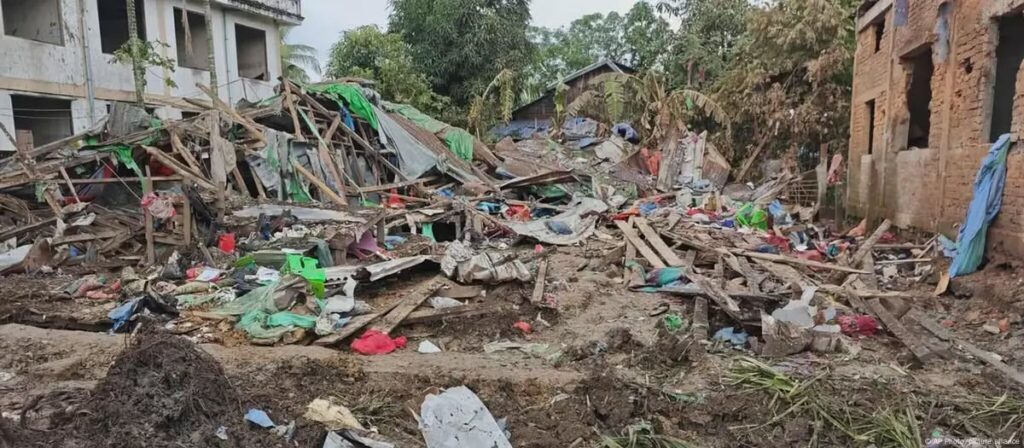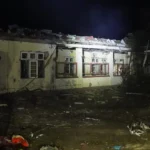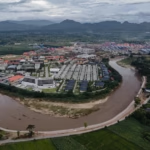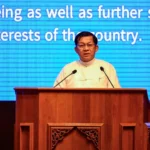
𝗪𝗵𝘆 𝟱𝟬𝟬-𝗽𝗼𝘂𝗻𝗱 𝗯𝗼𝗺𝗯𝘀 𝘄𝗲𝗿𝗲 𝗱𝗿𝗼𝗽𝗽𝗲𝗱 𝗼𝗻 𝘀𝗰𝗵𝗼𝗼𝗹𝘀 𝗶𝗻 𝗥𝗮𝗸𝗵𝗶𝗻𝗲 𝗦𝘁𝗮𝘁𝗲
𝗧𝗿𝗮𝗴𝗲𝗱𝘆 𝗶𝗻 𝗞𝘆𝗮𝘂𝗸𝘁𝗮𝘄 𝗧𝗼𝘄𝗻𝘀𝗵𝗶𝗽
At least 18 students were killed in western Myanmar’s Rakhine State after the military junta carried out an airstrike targeting two private schools in Kyauktaw Township, the Arakan Army (AA) announced on Saturday. The incident occurred shortly after midnight on Friday when students, aged 15 to 21, were sleeping in their dormitories.
According to the AA, a junta warplane dropped two 500-pound bombs directly on the school buildings. The strike not only killed 18 young people but also left 22 others wounded, many with serious injuries. The armed group described the incident as an attack on innocent lives, saying:
“We feel as sad as the victims’ families for the death of the innocent students.”
Independent media reports, including AFP, confirmed the casualties, though access to the conflict zones in Rakhine remains restricted.
International Condemnation
The attack drew swift condemnation from the United Nations Children’s Fund (UNICEF), which called it a “brutal attack” and part of a wider pattern of increasing violence in the region. UNICEF stressed that children and families in Rakhine State are being forced to bear “the ultimate price” of the conflict.
Human rights organizations have long accused the Myanmar military of targeting civilian areas, including schools, clinics, and monasteries, in an effort to intimidate communities and weaken ethnic armed resistance. This latest strike reinforces concerns that the junta is escalating its use of air power to maintain control amid growing battlefield losses.
Rising Tensions in Rakhine State
Rakhine has emerged as one of the most volatile frontlines in Myanmar’s post-coup conflict. The Arakan Army, an ethnic Rakhine armed group, has gained control over several territories across the state over the past year, strengthening its influence both militarily and politically.
The junta, unable to secure key areas on the ground, has resorted to airstrikes and heavy artillery to push back against the AA’s advances. These attacks, however, often result in civilian casualties. Just last month, on August 25, a similar strike in Mrauk-U killed at least 12 people, including children, and injured another 20.
Observers warn that as the AA expands its territorial hold, the junta may increasingly rely on aerial bombardments, raising fears of more civilian casualties in the months ahead.
Myanmar’s Widening Conflict
Since the military coup of February 2021, when the armed forces overthrew Aung San Suu Kyi’s elected civilian government, Myanmar has been plunged into nationwide turmoil. The coup sparked massive protests, which quickly escalated into armed resistance when the military used deadly force against demonstrators.
Today, the junta faces resistance on multiple fronts:
Ethnic armed groups such as the AA in Rakhine, the Kachin Independence Army in the north, and the Karen forces in the southeast.
People’s Defense Forces (PDFs), newly formed militias made up of civilians opposing military rule.
In response, the junta has increasingly deployed airstrikes and artillery fire, often in populated areas, leading to allegations of war crimes and crimes against humanity.
Human Cost of Airstrikes
The tragedy in Kyauktaw underscores the devastating impact of Myanmar’s civil war on young people and families. Schools, which should be safe spaces for education and growth, have repeatedly become targets. International aid groups warn that such attacks are deepening the humanitarian crisis:
Thousands of families have been displaced across Rakhine and other states.
Children are losing access to education as schools are destroyed or shut down.
Civilian casualties continue to rise, with women and children disproportionately affected.
As global attention shifts elsewhere, the suffering in Myanmar often goes unnoticed, but the continuing cycle of violence in Rakhine State serves as a grim reminder of the ongoing crisis.
Outlook
With the Arakan Army’s influence growing and the junta under increasing pressure, observers fear that the conflict in Rakhine will only intensify. Unless international pressure mounts and meaningful negotiations occur, civilians — particularly children — will remain trapped in the crossfire of a war that shows no sign of ending.
.
Related posts:
 Policy Dilemmas and Stability: Bangladesh’s Approach to the Arakan Army
Policy Dilemmas and Stability: Bangladesh’s Approach to the Arakan Army
 Dozens Killed in Chaung-U as Myanmar Military Launches Paraglider Attack
Dozens Killed in Chaung-U as Myanmar Military Launches Paraglider Attack
 China Issues Wanted Notices for 100 Myanmar Scam Suspects
China Issues Wanted Notices for 100 Myanmar Scam Suspects
 Airstrike Destroys Mrauk U Hospital in Rakhine, Dozens Injured
Airstrike Destroys Mrauk U Hospital in Rakhine, Dozens Injured
 Scam Factories on the Thai–Myanmar Border: How Chinese Mafia Networks Operate
Scam Factories on the Thai–Myanmar Border: How Chinese Mafia Networks Operate
 Myanmar Junta Admits Polls Can’t Cover Entire Country
Myanmar Junta Admits Polls Can’t Cover Entire Country
